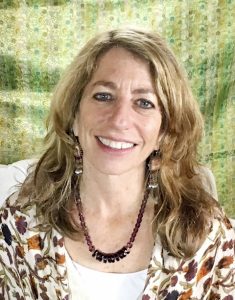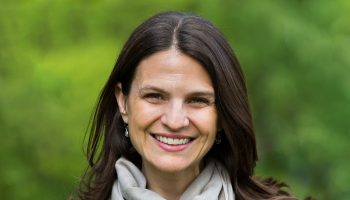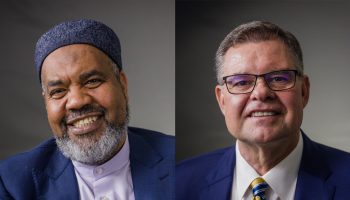Teenagers were more independent in some ways in the ‘70s, Mirabai Starr said, and this allowed her to move by herself to the Lama Foundation in New Mexico when she was 14. Founded in 1968, the spiritual community, educational facility, and retreat center is a place where all religions and spiritual traditions meet.

“They call it a meeting of the ways, and there’s not one religion, one guru, one teacher or a tradition,” Starr said. “All are welcome and deeply entered into through practices and study.”
She cannot remember a time when she wasn’t drawn to spirituality.
“Since I was a small child, I was drawn to the mystery,” she said. “And I think that increased as I got older, in proportion to some significant life experiences, mostly in the arena of death.”
Starr said her brother died when she was 7, and her first boyfriend died when she was 14.
“I would say those two events really tilled the soil of my soul’s yearning for something beyond what could be seen and touched directly,” Starr said.
Named on the 2020 Watkins List of the “100 Most Spiritually Influential Living People of the World,” Starr is the author of Wild Mercy: Living the Fierce & Tender Wisdom of the Women Mystic and a certified bereavement counselor, helping mourners harness the transformational power of loss. She will talk at 2 p.m. EDT Tuesday, July 28, on the CHQ Assembly Video Platform as the second part of the Interfaith Lecture Series Week Five Theme: “The Feminine Spirit.” Starr will discuss feminine-centric wisdom across multiple religions and teachings.
Starr said she has been a writer since she could pick up a pen, and she wrote her first poem, which was about autumn in New York, at the age of 8. Starr’s parents were supportive of her art and would read it to their friends.
“From an early age the message I got from my parents was, ‘You have an ability to say a lot with a few words,’” Starr said. “And I understood that that was some kind of gift that I could and should develop. I feel like I have both through my poetry and my prose writing.”
She wanted to be a fiction writer because that is what she loved to read. Starr’s first published work, however, was a creative nonfiction essay in the Sun Magazine in 1999. The Sun, she said, was “the perfect intersection for me because those are all my interests, literary, political and spiritual.”
Around her fourth book, Starr began to receive too many speaking and teaching invitations to be able to teach her classes at the University of New Mexico-Taos. She made little money at the university, so she decided to pursue the speaking engagements instead, transitioning from teaching at a public university to traveling and teaching mostly privileged people.
“A lot of the white women that I work with are desperately wanting to wake up, be relevant, be of service and dismantle their unconscious white privilege,” Starr said. “It was just a big shift from actually being with people who are struggling to lift themselves in their lives and educate themselves.”
Before the pandemic, Starr traveled once a week for engagements.
“I felt like I was on this train that was hurtling through the universe at warp speed and I couldn’t get off, and I knew I wanted to and needed to but I didn’t know how,” Starr said. “The pandemic just brought me to a screeching halt. And sure enough, it was like the tree of my soul was watered by being still, being home.”
For around the past seven years, Starr has been dedicated to dismantling white privilege, which she said is prevalent in spiritual spaces in which she teaches, such as the yoga community and the American Buddhist community. Starr said helping these people understand their own unconscious part in systemic racism requires her to continuously look at herself.
“Just because I’m doing the same anti-racist work doesn’t mean that I do not also perpetuate the various structures that have oppressed people of color, especially Black people, but, yes, people of color,” Starr said. “I always begin by using myself as an example of a work in progress that’s continuously needing to do that rigorous self inquiry.”
Since the murder of George Floyd on May 25, she said more white people, including those in the spiritual community, have been talking about racism.
“I have felt really lonely in that work for a long time. I’ve made myself very vulnerable in communities of color, as I step up and constantly mess up and am corrected very publicly. I get to practice not having a fragile, white response to the feedback I get from people of color,” Starr said. “It would be so much easier not to do that work and stay in my comfortable, little, white, spiritual bubble, but I can’t and I won’t.”
In her lecture, Starr will be discussing feminine wisdom across many religions and spiritual traditions. She said much of the teachings of these traditions are written by and for men, and she aims to “reclaim a more feminine-centric way of understanding, and practicing these great, spiritual treasures.”
“When I say masculine and feminine, I’m speaking of the masculine and the feminine in people of all genders,” Starr said. “I’m not just bifurcating the sexes, you know, ‘Women are embodied and relational and men are disembodied and individualistic.’ It’s looking at those qualities in all of us.”
This program is made possible by the Rachel Alice Miller Memorial Fund.




